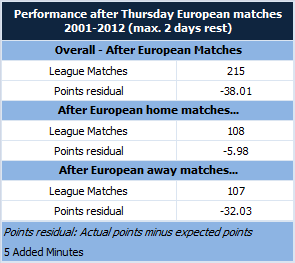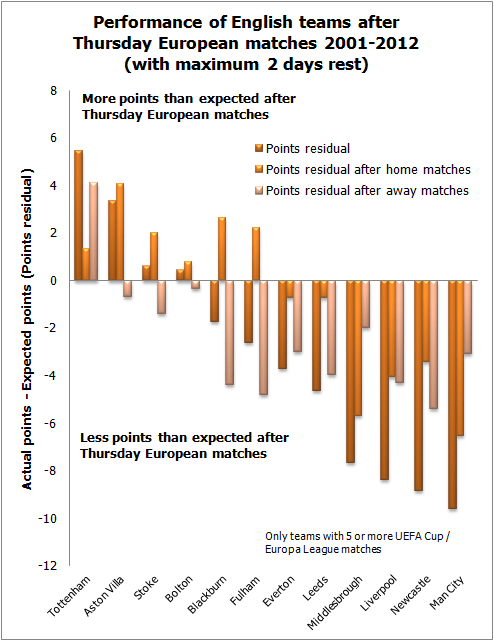The Europa League and the Thursday night effect

Liverpool are one of three Premier League teams playing in the Europa League this season
“The Europa League takes an even bigger toll [than the Champions League] in my opinion, that’s the problem,” said Harry Redknapp in April 2011. “That Thursday night one, every week, and playing Sundays every week.”
It’s hard not to see his point; almost all teams involved in the Europa League get two days rest between their European match and domestic league fixture. Champions League teams may get up to four or even five days.
But do the supposed disadvantages hold true in reality? I’ve looked at how teams playing on Thursday nights in the UEFA Cup and Europa League have performed relative to expectations on the following Sunday.
We set expectations based on historical betting data from football-data.co.uk. Bookmakers’ odds add up to more than 100%, but we can normalise these odds to give us the probability of a home win, away win and draw.
From these probabilities we can estimate expected points for both teams. An example match: Team A has a 60% chance of winning, Team B a 10% chance of victory and a draw 30% chance. Therefore the expected points for Team A is (3 x 0.6) + 0.3 = 2.1 points, and Team B (3 x 0.1) + 0.3 = 0.6 points. Therefore if the same match was played hundreds of times, Team A’s average points from these games would be 2.1, and Team B’s 0.6.
Over the course of time, we expect teams to score as many points as you’d expect. Any difference between actual points and expected points is known as residual points.
We can now compare Sunday’s actual points and expected points for teams who played on Thursdays in Europe. One of three outcomes is possible:
- If there was no effect of playing on Thursday and Sunday, actual points would be roughly equal expected points, giving us a residual of zero.
- If there was a negative effect of playing Thursday and Sunday, we would expect a negative residual: teams collect fewer points than expected.
- If there was a positive effect of playing Thursday and Sunday, we would expect a positive residual: teams collect more points than expected.
It turns out the second outcome holds true: teams consistently drop points when playing on Sundays after Thursday European matches.

In 215 league matches after Thursday European matches since 2001, teams have scored over 38 points fewer than you’d expect. The effect is particularly pronounced after European away matches, where teams have scored 32 fewer points than expected.
Another way of looking at this: for about every three Thursday European away matches, teams drop one point on the following weekend. After home games, it’s only one point dropped every 18 weekends. This makes sense; travel is likely to erode performance.
Sunday matches between two teams who have both played on Thursday are excluded.
There is some variation by team, too. Curiously, Redknapp’s former team Tottenham have actually scored more points after European games since 2001, but it seems unlikely that this will hold over time.

Two teams in this year’s competition – Liverpool and Newcastle – have had unfavourable histories with the competition in terms of the effect on league form. Nine of the twelve teams dropped more points after away matches in Europe than after home games.
A few points to consider:
- These results support evidence on The Power of Goals blog and a study led by Raymond Verheijen.
- The teams analysed did not systematically drop points in league matches not following Thursday European matches.
- Betting odds are a good way to set expectations for results, but can be influenced by the volume of bets placed.
- The odds may not reflect team selection. For example, Middlesbrough and Fulham may have selected weaker teams in a bid to sustain their European runs, leading to a negative points residual.
We have already seen Newcastle and Liverpool field supposedly weaker teams away from home in the first round of group matches this season. As teams qualifying for Europe’s second-tier competition look to push for Champions League places through league results, this may be a sign of things to come.

Reblogged this on We love football. +Injury Time Equaliser.
Name * Email * Website XHTML: Vrei formatare cu taguri? Poftim:<a href="" title=""> <abbr title=""> <acronym title=""> <b> <blockquote cite=""> <cite> <code> <del datetime=""> <em> <i> <q cite=""> <strike> <strong>
Has anyone ever looked into Verheijen’s figures?
I don’t think it’s a Europa League or a CL thing, it’s just a rotation thing. As Raymond often bangs on about, two rest days is inadequate. Some teams can cope better than others, depending on style and squad depth.
Someone like MON who sets his teams up to run around chasing the ball and rarely rotates is going to suffer from Europa League involvement (which is why he always did his utmost to get knocked out of it at Villa) and at busy times in the calendar.
I think Spurs will suffer in the league this season, due to their pressing style and AVB’s love of the Europa League.
Sorry yes should have made this clearer – I believe it’s a rest and rotation thing, not a European game thing (though travel may come into it). In which case I totally agree with you.
I think it’s all worthy of analysis anyway, it’s great to see a piece on this subject. Really good job.
I remember seeing another article somewhere suggesting there was no effect on the performance of CL teams in the following league match.
I guess CL teams possess a wider squad and also they will sometimes get three days rest, rather than the standard two days that Europa League teams invariably have to adjust to.
Cheers Bob – and again, agree on all points!
Meant to also say, it’s perhaps unsurprising that Spurs and Villa fare best, considering the attitudes of Redknapp/MON towards the competition. Not sure about previous Spurs coaches like Jol, I would need to dig out some old team sheets.
Great stuff! Are there reasons to believe that the odds is somewhat settled for the European League effect (it should be)? If the two teams would have played in a regular Saturday game with no European games before, would the odds be the same? That is something that is interested to dig into, but it is of course a very hard thing to analyse properly.
If there is a European League effect in the odds, the true disadvantage with Thursday night games is even greater though.
I personally don’t think the odds are at all adjusted for the ‘European effect’, but I can’t be sure.
From what I’ve read and talked to people about, it’s not taken into account when creating odds but as already mentioned, odds can be affected by large volumes on betting by people who may believe in such a theory of this effect. As a statistician (and a picky one at that) the only thing I would add is a histogram showing the distribution of points lost, as the total residual points can potentially fall to a cumulative effect. Otherwise a very interesting and well thought out piece.
Cheers Raj – and noted, will try and get one in for similar analyses
Really, the study needs to be done involving players (rather than just the teams). Eg, those players involved in games on both the Thurs and Sun, how did they perform.
For instance, Liverpool played Suarez and Gerrard against Hearts, both were woeful against Arsenal on the Sunday. Then they rested them both against Young Boys and both were much more effective against Man United.
Then you can clear up the whole rotation / travel conundrum. After all, it’s the players who suffer from fatigue, a team isn’t a person.
I agree to an extent, but that’s a much harder effect to quantify – if someone for example passes less on the weekend, is that because of the opposition or fatigue?
What I would say is that a number of the teams that have played in the Europa league are from outside the teams with traditionally large squads, and therefore a number of players play in both games.
What I’ve shown is that there is a systematic effect of playing on Thursday and Sunday – the mechanism of this effect is likely to be fatigue, exacerbated by travel. I can’t think of many other potential reasons?
Very much agree with what you’ve said. Good article.